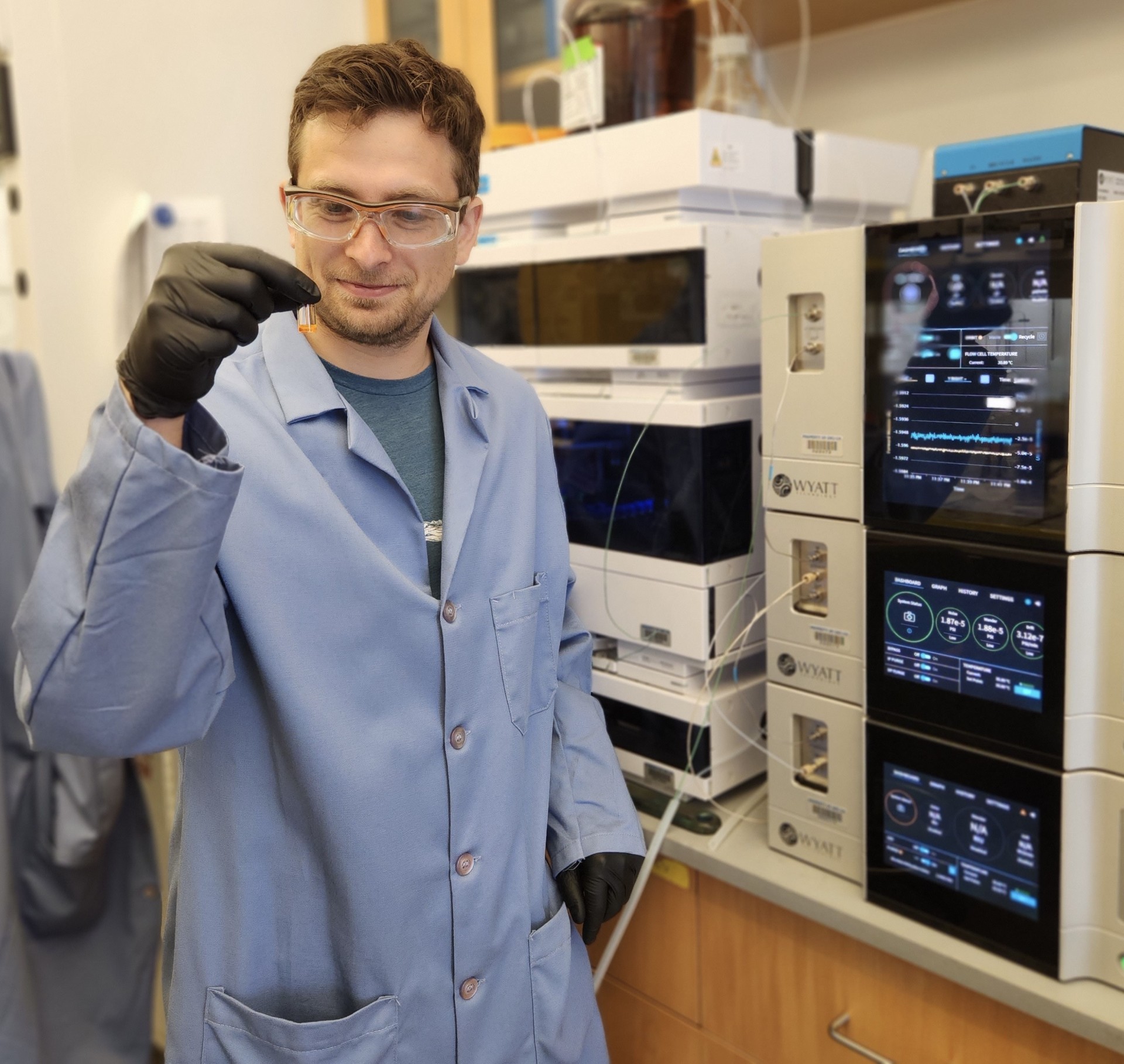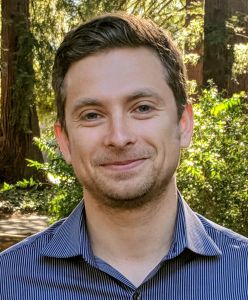Alex Zhukhovitskiy Named 2025 Camille Dreyfus Teacher-Scholar for Excellence in Research and Teaching

Aleksandr (Alex) Zhukhovitskiy is remaking the logic of plastic design from the molecular level up, while training a new generation of chemists to think creatively about one of the world’s most pressing problems: how to make plastics not just functional, but sustainable.
July 24, 2025 | By Dave DeFusco
Aleksandr (Alex) Zhukhovitskiy, an expert in polymer chemistry and soft materials and an associate professor in the Carolina Department of Chemistry, has been named a 2025 Camille Dreyfus Teacher-Scholar, one of the most prestigious national honors for early-career chemists who combine groundbreaking research with a deep commitment to teaching. The award comes with a $100,000 unrestricted research grant.
Diane Royle, senior director of UNC’s Office of Foundation Relations and Industry Engagement, was the administrative point-of-contact with the Dreyfus Foundation as part of UNC FRIE’s role to foster meaningful engagement with companies and foundations and to advance UNC’s mission.
“Dr. Zhukhovitskiy’s approach to chemistry is both visionary and pragmatic,” said Royle. “He is not only advancing fundamental science, but doing so in a way that has real-world implications for sustainability, education and industry. His work is a great example of the power of university research to shape a better future.”

Zhukhovitskiy is remaking the logic of plastic design from the molecular level up, while training a new generation of chemists to think creatively about one of the world’s most pressing problems: how to make plastics not just functional, but sustainable.
“Since arriving at UNC, Alex has been a true original thinker, devoted mentor and a leader in reimagining how to design and utilize polymers,” said James Cahoon, chair of the Department of Chemistry. “This award is a well-deserved recognition of his continuing contributions to the department, his students and the field.”
Plastics are everywhere—from smartphones and shoes to surgical tools and solar panels. But they’re also one of the most intractable sources of pollution, clogging landfills and oceans for centuries. Zhukhovitskiy’s research focuses on making the design, reuse and breakdown of plastics more intelligent and sustainable.
He is one of the first to ask: what if we could rewrite the very backbone—the grammar—of plastic molecules? He calls this “polymer skeletal editing,” and it could transform how plastics are made, reused and eventually broken down. One of his biggest recent breakthroughs, published in Nature, involves reconfiguring rubber and other common plastics into useful new materials through precise atomic rearrangements—essentially rewriting their “molecular sentence structure” to turn trash into treasure.
In another line of research, Zhukhovitskiy is addressing one of polymer science’s longest-standing mysteries: entanglements. These are invisible knots and tangles that help make plastics strong and stretchy—but until now, scientists didn’t fully understand how to control them.
Using ideas from supramolecular chemistry, which studies how molecules interact and stick together, Zhukhovitskiy’s lab has begun to design entanglements with atomic precision. His elegant solutions, described by colleagues as “obvious in retrospect” but elusive for 80 years, have opened new pathways for designing tougher, more adaptable soft materials.
A third branch of his work focuses on building plastic-based materials that conduct electricity—an important step toward flexible electronics, wearable health monitors and next-generation sensors. Zhukhovitskiy’s lab has invented new ways to grow these polymers using transition-metal catalysts, allowing scientists to build up complex materials with unusual shapes, electrical properties and responsiveness to light.
When the COVID-19 pandemic forced a shift to online learning, Zhukhovitskiy transformed his undergraduate Polymer Chemistry Laboratory into a remote research experience, where students designed and ran their own experiments from home. One faculty observer called it “lemonade from lemons,” and two students later published their work in a peer-reviewed journal and went on to top chemistry Ph.D. programs.
He has since continued to reimagine how students experience science. From founding the Carolina Chemistry Student Seminar Series to running an outreach program that brought chemistry demonstrations to more than 1,000 K-8 students in local schools, Zhukhovitskiy is a tireless advocate for inclusion, curiosity and mentorship.
Zhukhovitskiy earned his Ph.D. from MIT, where he worked under polymer luminary Jeremiah A. Johnson. For his doctoral work, which produced 10 papers and three patents, he earned the 2018 ACS Nobel Signature Award, one of the highest honors for graduate research in chemistry.
After a prestigious postdoctoral fellowship with leading chemist F. Dean Toste at UC Berkeley, Zhukhovitskiy joined the UNC faculty in 2019. In just five years, he has published 17 papers in top journals, earned four patent applications and mentored more than 40 researchers, including high school students and teachers, undergraduates, graduate students and postdoctoral fellows. His mentees have gone on to win National Science Foundation Graduate Research Fellowships, enter top Ph.D. programs and land national awards for their work.
With his Camille Dreyfus Teacher-Scholar Award, Zhukhovitskiy now joins a select group of scholars whose dual excellence in research and teaching is reshaping the future of chemistry. For him, it’s all part of a larger mission.
“Plastics are essential to modern technology, but these materials also represent a massive sustainability challenge, which we must work to address,” he said. “Just as chemistry is central to making plastics, so is it central to modifying them or breaking them down. And just as the research itself into such questions is critical, so is the education of students who will have to face the challenges we don’t solve today and new ones that may arise tomorrow.”

